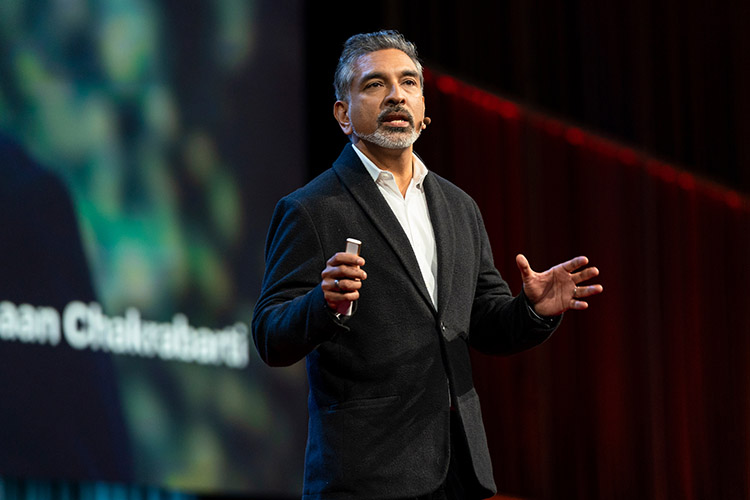Translating research into action can create real social change
UC Berkeley College of Environmental Design Dean Vishaan Chakrabarti, gives his vision for the college and how it can help tackle some of the world's greatest challenges.

February 17, 2021
Learning how to design the way a city is laid out, or a structure is built, is a highly nuanced process. But when that process moves beyond the research and into concrete action, it can inspire solutions to problems that can change the world.
That’s according to UC Berkeley’s new College of Environmental Design (CED) dean, Vishaan Chakrabarti, who said he hopes to create a community among the college’s students, staff and faculty with agency to impact some of the world’s greatest challenges, from climate change to racial inequity.
“Designers are asked to do an extraordinary thing, which is to dig inside yourself and try to synthesize a solution to a problem,” said Chakrabarti, who is also an alumnus of the Berkeley architecture program. “Our college has instrumental disciplines, so we can translate research into action through the lens of our instrumentality, which I think is a unique position to be in. Especially with the kind of passion our students bring to their work.”
Chakrabarti, who took over as dean of CED in July 2020, discussed his vision for the future of the college as part of a virtual Campus Conversations and Dean’s Speaker Series event on Monday. It’s a vision that he said focuses around the college’s shared values of sustainability, equity and agency.
After more than 25 years working in urban planning around the world and founding architecture firms such as Practice for Architecture and Urbanism, Chakrabarti moved from his home in New York to Berkeley just months after the pandemic began.
His decision to come back to his alma mater was not just out of nostalgia, he said. It stemmed from the university’s leadership approach to shared governance and doing things through consensus with the campus community.
“I wake up every day thinking, ‘How do I honor this choice that people are making to be part of our community?’” said Chakrabarti. “They see in our school a path to having an impact on social issues and climate issues. And to me, as a leader, having those shared values provides a really solid foundation to build upon.”
Chakrabarti, who originally immigrated from Calcutta, India, when he was two years old, also served as planning director of Manhattan, New York, in the aftermath of the 9/11 terrorist attacks. His time there gave him extensive experience in leading communities during times of crisis.
Building community at Berkeley, despite the pandemic, he said, has been a challenge. But the college has been able to connect virtually through specialized initiatives, such as the renaming of Wurster Hall to Bauer Wurster Hall, an effort Chakrabarti led in his first months as dean.
“For all the right reasons, given what’s going on in the world, we are stripping names from buildings on campuses around the country …” he said. “It was really great to do something positive with that movement of renaming, as opposed to only thinking about the sins of the past.”
Striving toward student equity has also been a major focus for Chakrabarti. While CED has the most diverse undergraduate student program on campus, he said the college’s graduate program is less diverse than it was when he graduated in the 1990s.
That can be attributed to the rise in tuition over the years, but the college needs to focus on finding ways to attract potential students from marginalized communities that sometimes cannot afford the program, said Chakrabarti.
“In CED, we have some of the greatest disciplines in the world, but they’re not the most highly compensated. So, students are rightly concerned about the amount of debt they are going to take on,” he said. “If we’re going to center our curriculum around having our students bringing equity — in terms of their work — into the world, then we’ve got to have that conversation inside the house, as well.”
In December 2020, the college received its largest gift ever — a $7.5 million donation to CED’s master of real estate development and design program. Moving forward, the college will focus on reaching out to more donors and finding other possibilities to bridge that gap, said Chakrabarti.
Chakrabarti said he hopes CED’s programs will continue to inspire new ways for people to design our cities and public spaces and to consider the gross racial inequities present within issues such as climate, housing and transportation.
The pandemic, Chakrabarti said, “is a small appetizer to what climate change is going to bring, and all of the strife around inequity that it’s going to highlight, just like the pandemic did.”
“This is our moment, coming out of this pandemic, to really rethink all of this, and I think we have to lean into it very heavily,” he added. “I’m hoping all of us — students, staff and faculty — all come together around this idea that we were founded as a school of action, that we have instrumentality in our work, and we can go out and have impact in the world.”